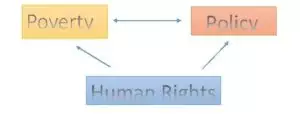Last week’s release of the federal budget came with much excitement and curiosity from the anti-poverty community. In the weeks leading up to budget we started to see small hints of the potential for a budget that would truly have an impact on the lives of the nearly 5 million people living in poverty in Canada.
The budget delivered in some respects for people living in poverty, and fell behind for others. We saw investments in the Court Challenges Program, shelters for persons fleeing violence, improved employment insurance benefits, increased legal aid funding, the new Canada Child Benefit, investments in affordable housing and financial commitments to address homelessness.
Unfortunately, the budget did not expressly mention the federal poverty reduction strategy. What we seem to have are several key commitments and investments in programing that would point to some sort of framework or base from which the poverty reduction strategy, Minister Duclos has been tasked with creating, could look like.
Much of what was laid out in the budget, to a degree, are proposals that Canada Without Poverty and Citizens for Public Justice have called for in our model anti-poverty plan Dignity for All, which we released in February of 2015. Whether it was commitments to improve existing affordable housing units, investments in programs to combat homelessness or ensuring that financial costs are not a barrier to accessing our court system. These commitments point to an understanding that there is no silver bullet solution to address poverty.
There are still many important commitments that need to be made and they must all come together under a pan-Canadian poverty reduction strategy. This is where a human rights approach comes in.
Simply put, poverty is a violation of human rights and if we are going to address poverty we have to start by understanding this.
What does a human rights approach to poverty reduction mean?
It means taking steps to ensure people living in poverty are consulted throughout any policy making processes. It means a greater recognition of economic and social rights and ensuring they are protected and upheld in our court system. It means that when anti-poverty measures don’t work, governments have to listen to those affected and make meaningful changes. It means deliberate and targeted measures to eliminate discrimination and pursue equality. These are just a few examples of what a human rights approach to poverty looks like. In fact, CWP even put out a guide for policy makers and frontline workers, appropriately called the Human Rights Guide to Poverty Reduction Strategies to help walk stakeholders through this process.
With this budget we are already seeing how a human rights approach could impact people living in poverty. Human rights are the responsibility of all levels of government, that means federal, provincial/territorial and municipal governments must work together to ensure the lives of people in poverty are protected. With the introduction of the Canada Child Benefit program (CCB) there is a risk that some provinces would attempt to claw-back social assistance funding from families who receive the benefit as well as other social assistance support. The result of claw-backs by provinces would be that those who need benefits the most – those receiving meager social assistance benefits – would be the ones not able to access the full amount of the CCB.
So far, the federal government has not announced any intentions to attach conditions to transfer benefits to make sure provinces can’t pull back payments.. However, a human rights approach would enable those who could experience claw-backs an opportunity to seek justice and claim their economic and social rights.
So what next?
This budget is a good first step, and another indication that government is serious about tackling poverty. CWP will continue to meet and get our message out to policy makers that we have to connect the dots – a human rights approach is essential to any poverty reduction strategy that this government puts forward.
James Armbruster is the Development and Communications Coordinator with Canada Without Poverty
Canada Without Poverty is a non-partisan, not-for-profit, charitable organization dedicated to the elimination of poverty in Canada. CWP is here because of your support. We would not be able to continue our work in eliminating poverty without your help. Please consider making a donation to CWP to support our work in ending poverty for everyone in Canada.


